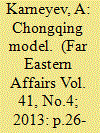| Srl | Item |
| 1 |
ID:
126846


|
|
|
|
|
| Publication |
2013.
|
| Summary/Abstract |
In the second part of this article (the first was published in Far Eastern Affairs, # 3, 2013), the author continues to seek answers to a number of questions associated with the need for an objective assessment of the so-called "Chongqing model.
|
|
|
|
|
|
|
|
|
|
|
|
|
|
|
|
| 2 |
ID:
124200


|
|
|
|
|
| Publication |
2013.
|
| Summary/Abstract |
In the year that has passed since the "Chongqing drama" began, a great many works have been published that throw light on the unique experience of the socioeconomic development of one of China's regions. Was there truly a "Chongqing model"? If so, what were its distinguishing features? What kind of future might the leftist leanings of the public political spectrum have after the 18th CPC Congress? This article attempts to answer a number of questions associated with the need for an objective assessment of the "Chongqing model."
|
|
|
|
|
|
|
|
|
|
|
|
|
|
|
|
| 3 |
ID:
148770


|
|
|
|
|
| Summary/Abstract |
Song Binbin, the daughter of prominent CCP politician Song Renqiong, has long been accused of having played a role in the death of Bian Zhongyun which took place at the Girls' Middle School in Beijing Normal University on 5 August 1966. In January 2014, she publicly apologized for the violence that occurred at her school during the summer of 1966. However, instead of applauding her act of contrition, rebel participants of the Cultural Revolution used the opportunity to criticize the sons and daughters of high-ranking cadres and to try to overturn the 1981 official evaluation of the Cultural Revolution by promoting a positive view of that period in Chinese history. This paper analyses the background, consequences and implications of Song Binbin's apology from a political science cum memory studies perspective. It argues, against the background of a changing political landscape in the People's Republic of China, that the memory of the Cultural Revolution remains a battlefield of divergent memory groups and multiple narratives. In the memory of today, the struggles of the Cultural Revolution have still not come to an end.
|
|
|
|
|
|
|
|
|
|
|
|
|
|
|
|